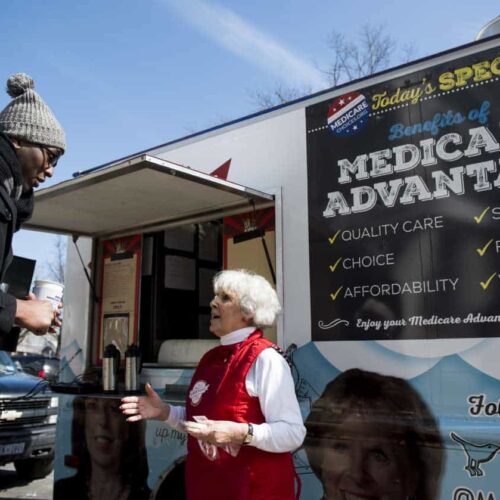Introduction
Private Medicare Advantage plans treating the elderly have over-billed the government by billions of dollars, but rarely been forced to repay the money or face other consequences for their actions, according to a new Congressional audit.
In a sharply critical report made public Monday, the Government Accountability Office called for “fundamental improvements” to curb overbilling by the health plans, which are paid more than $160 billion annually. The privately run plans, an alternative to traditional fee-for-service Medicare, have proven popular with seniors and have enrolled more than 17 million people. The plans, which were the subject of a Center for Public Integrity investigation, also enjoy strong support in Congress.
GAO took aim at Medicare’s primary tactic for recouping overcharges, a secretive, and lengthy, audit process called Risk Adjustment Data Validation, or RADV. Unlike many other anti-fraud programs, RADV has cost the government way more than it has returned to the treasury.
The GAO said that the Centers for Medicare and Medicaid Services, an arm of the Department of Health and Human Services, has spent about $117 million on these audits, but so far has recouped just $14 million. CMS officials counter that the mere threat of RADVaudits has caused health plans to voluntarily return approximately $650 million in overpayments – and that upcoming audits will recover tens of millions more.
“As the MA (Medicare Advantage) program continues to grow, safeguarding the program from loss is critical,” the GAO report said. The report did not name any of the health plans studied.
The GAO launched its audit in October 2014 in the wake of the Center for Public Integrity’s “Medicare Advantage Money Grab” series. The articles documented nearly $70 billion in “improper” payments to health plans — mostly inflated fees from overstating patients’ health risks — from 2008 through 2013 alone.
The Center’s investigation traced the overpayments to abuse of a billing formula called a risk score, which pays higher rates for sicker patients and less for people in good health. Since 2004, however, the risk score formula has largely operated as an honor system, despite criticism that many health plans have overstated how sick some patients are to boost their revenues. That practice is known in medical circles as “upcoding.”
In addition, CMS records released to the Center for Public Integrity through a court order in a Freedom of Information Act lawsuit show that over-billing has wasted tax dollars almost since risk scores were introduced in 2004. One confidential review of 2005 payments determined that nearly a third of patients enrolled in 22 health plans weren’t as sick as was claimed. The audit projected overpayments of $4.2 billion as a result. Other CMS documents reveal that officials dubbed these health plans “high-flyers,” but did little to reel them in, while RADV audits dragged on for years without reaching conclusions.
Medicare officials have quietly conducted these audits since 2008. But they have never imposed stiff financial penalties even as evidence built up that billing errors were deeply rooted and wasting tax dollars at an alarming clip.
GAO in its report noted that CMS has failed to target health plans with “known improper payment risk,” thus allowing the worst performers to escape the net. The GAO also criticized the agency for allowing audits and appeals to drag on for years. Some audits of 2007 payments to health plans are still under appeal, for instance.
In response to the GAO report, America’s Health Insurance Plans, the industry’s trade organization, said that an “unconfirmed diagnosis” in an audit doesn’t necessarily mean that the person doesn’t have the disease.
And in recent public comments, the trade group has criticized the RADV audit review process as not yet complete or “fully tested,” to assure that it is “stable and reliable.”
David Lipschuz, an attorney with the Center for Medicare Advocacy, said his advocacy group was “troubled” by the extent of the improper payments to Medicare Advantage plans and the government’s “lack of progress on recouping and deterring such payments.”
In an emailed statement, he added: “We hope that policymakers who protect MA (Medicare Advantage) profit at all costs, while at the same time often proposing to shift more costs on to the majority of beneficiaries in traditional Medicare, take heed of this GAO report and ensure that the recommendations are implemented.”
GAO reviewers said that CMS is stepping up the RADV audits, but added that much more needs to be done. GAO noted that officials expect the upcoming audits to recover $370 million, but that’s just three percent of the total estimated annual overpayment.
CMS officials said they have begun auditing Medicare Advantage payments from 2011 and 2012 and have set a goal to have all Medicare Advantage contracts audited yearly.
“HHS is strongly committed to program integrity in the Medicare Advantage (MA) program and takes seriously our responsibility to protect taxpayer dollars by identifying and correcting improper payments,” the agency said.
While federal audits have struggled for years to stamp out these overcharges, at least a half-dozen whistleblowers have filed lawsuits accusing Medicare Advantage plans of ripping off the government.
In the most recent Medicare Advantage whistleblower case to surface, South Florida doctor Mario M. Baez alleges that insurance giant Humana Inc. knew of billing fraud at some South Florida clinics but did little to stop it. Baez argues that inflating risk scores not only wastes taxpayer dollars but also can harm patients. The suit, which was unsealed in late February, is pending. Humana has declined to comment on it.
Read more in Health
Medicare Advantage Money Grab
Medicare failed to recover up to $125 million in overpayments, records show
Audits reveal that Medicare overpaid five insurance plans by $128 million, but recovered only $3 million
Health
Medicare Advantage audits reveal pervasive overcharges
35 of 37 health plans cited for overbilling on treatment of some diseases


Join the conversation
Show Comments
I really appreciate your professional approach. These are pieces of very useful information that will be of great use for me in future.
doctors in San Antonio TX
It’s good to know that private Medicare health plans have caused an increase in the number of doctors performing house calls. My parents are getting old, and they can’t get out of the house very well to go see a doctor whenever something happens to them. I’ll pass this information along to them so that they can look into their options for Medicare plans that include house calls.
This is information that the American public needs to be far more aware of, rather than the daily drama distractions of Washington politics that have no direct effect on most people’s lives. Knowing how medical coverage/billing operates for Medicare provides a much-needed perspective on something that many take for granted — including their assumption that health insurance is a good thing. Tallying the horror stories from all sides of healthcare (patients, medical staff, government payouts to insurance, etc.), only highlights how much better off we all would be WITHOUT insurance interference. The government’s inability to regulate overpayments that they are… Read more »